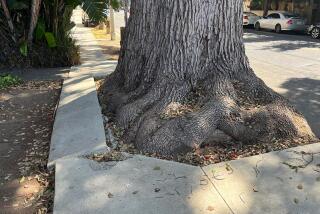Impasse on Bus Benches May Be Over
- Share via
Los Angeles city officials could soon make a Canoga Park-based sandwich shop owner, who has quietly consolidated control of nearly all the city’s 6,700 bus benches, L.A.’s official bus bench king.
Under a pending proposal tentatively slated for consideration next month, William Giamela, a leading figure in the Giamela submarine sandwich chain, would gain exclusive right to sell advertisements on the city’s bus benches in exchange for replacing and maintaining them.
The proposed franchise agreement has been stalled in committee at City Hall for three years. But now, thanks in part to a related city effort to renegotiate a contract for bus shelters, City Councilwoman Rita Walters, who heads the Public Works Committee, plans to revive the moribund bus bench issue.
If the contract is approved, not only would one of City Hall’s longest-running controversies be laid to rest, but Giamela, a peddler of spicy Italian-style subs served at neighborhood restaurants, would seal his hold over a corner of the competitive transit advertising business.
Supporters say the contract would improve maintenance of the bus benches, while giving the city a cut of the advertising revenues.
The contract would guarantee replacement of wooden benches with graffiti-resistant plastic. They would be cleaned at least once a month and equipped with litter baskets. And the city would also get between 22% and 38% of Giamela’s advertising revenues--minus $246,000 in oversight costs.
For years, the City Council has balked at the deal. Pressured by constituents with wildly different views on the benches, and plagued by questions about Giamela and his profits, council members referred the matter to a series of committees, each of which requested time-consuming study.
“This bus bench issue is like a tar baby. I can’t cut it loose,” complained James Washington, chief street use inspector with the city’s Bureau of Street Maintenance.
The issue was frozen several years ago when residents who supported beautification of business districts took a stand against permitting advertising on the benches.
At the time, that issue was resolved by City Councilman Nate Holden, who introduced a provision to allow some neighborhoods to replace Giamela’s benches with ones of their own choosing, while sparing Giamela some maintenance costs.
But even with the controversy quieted, the contract has languished for months. One problem, City Council aides said, is that the file was misplaced.
The city can only guess at Giamela’s revenues from the contract, said Washington. Bus bench advertisements sell for $20 to $100 per month, depending on the area, said Craig Heard, president of a competing company.
Many bench companies struggle to keep 50% of their advertising space filled at any given time, and the business is highly seasonal, said Heard, who guesses that Giamela--who declined to comment in detail about his business--bills $2 million a year in advertisements. Many benches are four decades old, said Washington, and block the passage of wheelchairs, in violation of more recent laws.
City codes require the benches to be cleaned of graffiti. But aside from this, “they only get cleaned by an occasional bus rider who sits there and does it with their trousers,” said Washington.
Long ago, bus benches were placed by anyone who wanted to advertise, said one former city official. There were so many that they blocked sidewalks. To control them, the city finally instituted a permit system, the same one in place today. In theory, for $12 per year, anyone can place a bench at a bus stop.
But in practice, all the allowable bench permits are taken, and virtually all are in Giamela’s hands. He pays about $80,000 per year in permit fees.
Interviewed briefly by phone, Giamela, who is in business with his son William, declined to speak in detail about the business, and did not return follow-up phone calls.
“We hope everything is going to be resolved and signed by the end of June,” he said. The long delay, “has been very confusing to us. It’s just gone around and around.”
Although Giamela is now the city’s undisputed bus bench baron, it was not always so.
Eight years ago, when the city’s Public Works Commission first began considering a franchise agreement to clean up the bus benches, there were two large bench companies in the city: Norman Bench Advertising, owned by Giamela, and Coast United.
They were the only two to bid on the contract. The day before public works officials were to announced the selection of Norman Bench to the City Council, Giamela surprised them by buying his competitor.
Washington, who has recommended that the council approve the contract, describes Giamela as a “very personable” man with an entrepreneurial flair and a genuine interest in improving the city’s bus amenities.
Giamela has even gone so far as to design and experiment with a new graffiti-resistant bench made out of recycled plastic while waiting for his contract to be approved.
More to Read
Sign up for Essential California
The most important California stories and recommendations in your inbox every morning.
You may occasionally receive promotional content from the Los Angeles Times.













